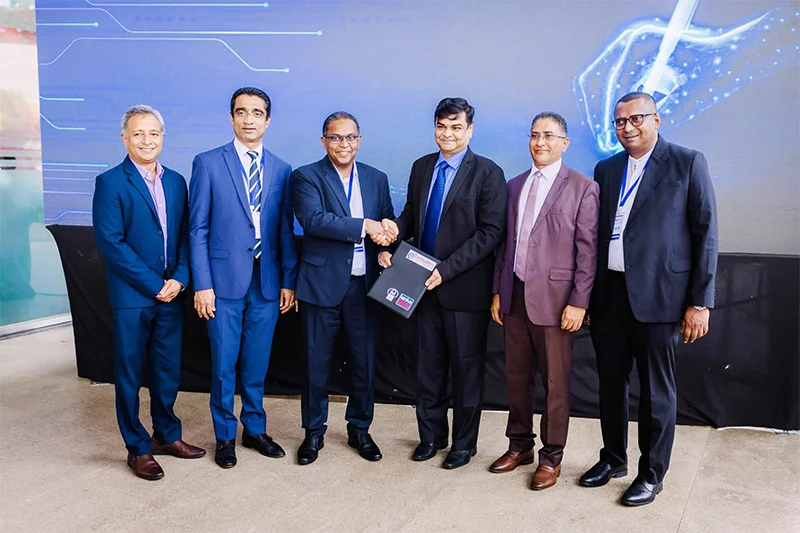Business
Can Debt-for-Climate and Nature Swaps help make Sri Lanka’s debt more manageable?


Lakmini Fernando is a Research Fellow at IPS with primary research interest in Development Economics, Public Finance and Climate Change. She has expertise in econometric data analysis, research design and causal methodologies. Lakmini holds a BSc in Agriculture from the University of Peradeniya, a Master of Development Economics (Advanced) from the University of Queensland, Australia and a PhD in Economics from the University of Adelaide, Australia.
 Sunimalee Madurawala is a Research Economist at the Institute of Policy Studies of Sri Lanka (IPS). She has over 15 years of research experience in the areas of gender, health economics and population studies. Sunimalee holds a BA (Economics Special) degree with a first-class and a Masters in Economics (MEcon) degree from the University of Colombo, Sri Lanka.
Sunimalee Madurawala is a Research Economist at the Institute of Policy Studies of Sri Lanka (IPS). She has over 15 years of research experience in the areas of gender, health economics and population studies. Sunimalee holds a BA (Economics Special) degree with a first-class and a Masters in Economics (MEcon) degree from the University of Colombo, Sri Lanka.
By Dr Lakmini Fernando and Sunimalee Madurawala
Sri Lanka’s economic crisis, fuelled by unsustainable debt and a default in 2022, left the country struggling to stabilise its economy. Its high climate vulnerability that disrupts livelihoods exacerbated the economic challenges. In the face of dual pressures from an economic crisis and climate vulnerability, the need for alternative approaches to financial recovery has never been more urgent. Therefore, debt-for-climate-and-nature (DfCN) swaps could be a possible option to lower the financial burden while addressing climate challenges.
The Need for Alternative Financing Options in Sri Lanka
Sri Lanka was forced to default on its external debt and seek a USD 3 billion bailout from the International Monetary Fund (IMF) in March 2023. Its total debt stock stood at USD 92 billion, with 40% being external debt in 2023. Sri Lanka’s debt portfolio is complex and its outstanding debt to China and India accounted for 18% of total external debt (59% of bilateral loans) in September 2022 (Figure 1). Amidst the conclusion of debt restructuring, Sri Lanka might benefit by opening to alternative financial instruments.

DfCN Swaps as an Alternative
DfCN swaps are a sovereign debt restructuring tool that helps (partial) restructuring of external debt in exchange for domestic investment in climate action. Well-designed DfCN swaps provide debtor countries the fiscal space to invest in climate adaptation and biodiversity sustainability.
With unsustainable debt and climate change identified as pressing issues for developing countries, Sri Lanka emerges as a priority country for DfCN swaps. Earlier, DfCN swaps followed a ‘piecemeal approach’ – implementing smaller, uncoordinated projects and managing funds through extrabudgetary channels. In contrast, recent swaps follow a ‘systematic approach’ – focusing on broader programmes instead of individual projects and providing budget support by channelling funds directly into debtor countries’ national budgets. This approach makes DfCN swaps more effective by mobilising larger amounts of funds, increasing debtor governments’ accountability, linking payments to performance, and aligning Nationally Determined Contributions (NDCs) and National Biodiversity Strategies and Action Plans (NBSAPs) in target setting.
Global Context and Debt Swap Options for Sri Lanka
DfCN swaps was first introduced in 1984 in response to the deteriorating tropical rain forests and mounting debt obligations in Latin America. Since then, many countries have adopted DfCN swaps to address both financial and environmental challenges.
In 2002, the United States (US) engaged in a bilateral swap with Peru, subsidised by NGOs such as The Nature Conservancy (TNC),
to protect over 1 million hectares of wilderness areas. The US has also engaged in similar swaps with Guatemala and Indonesia to protect tropical forests.
In 2015, Seychelles, pioneered a Blue Economy debt for nature swaps, converting USD 21.6 million of sovereign debt with Paris Club creditors to fund marine conservation. This is considered the world’s first debt swap for ocean conservation and climate adaptation.
Belize engaged in a ‘tripartite blue economy swap’ with the TNC in 2021, which reduced its external debt by 10% of GDP. TNC helped Belize to buy back USD 553 million of national debt borrowed from commercial creditors (30% of GDP) by issuing USD 346 million in blue bonds (10% of GDP). In response, Belize agreed to invest in marine conservation. This deal allows buy back of entire external commercial debt by TNC and Belize to invest USD 4 million annually on marine conservation until 2041 aiming to increase marine-protection parks from 15.9% of its oceans to 30% in 2040. Hence, this deal addresses the triple objectives of restoring debt sustainability, promoting sustainable development and enhancing climate resilience.
In 2023, Ecuador entered into the world’s largest DfCN swap, facilitated by Credit Suisse, buying back USD 1.6 billion of sovereign debt for USD 656 million in new sovereign debt. In return, Ecuador agreed to allocate USD 450 million in long-term marine conservation in the Galápagos Islands. The success of this deal was driven by several key factors: participation of academia, collaboration and consensus among multiple stakeholders including civil society and local governments, an innovative financing model, and government leadership.
The effectiveness of swaps depends on the ability to address several key challenges: political and macroeconomic stability to ensure long-term accomplishment; stable institutional structures to denote stability in planning and implementation; strong regulatory frameworks to cover both financial and environmental obligations; and knowledge/skills on swaps at every level of the public service. Accordingly, the success of DfCN swaps is dependent on the leadership role of debtor governments and a systematic approach in the designing and implementation of swaps.
Debt swaps are determined collectively by the respective parties involved, hence, it is difficult to predict the magnitudes of these swaps. However, following the three criteria proposed by Boland (2023) on the magnitude of debt, type of lending (whether it is a commercial or concessional loans) and interest of the creditors (considering the country’s track record), Sri Lanka may consider the following four creditors for a possible DfCN swap in the future (Table 1).
Way Forward
In addressing the triple challenges of high indebtedness, climate change and loss of nature, DfCN swaps can serve as an effective alternative fiscal instrument for debt-ridden Sri Lanka. Systematic planning and stringent government commitment and all relevant key stakeholders are crucial for its success. Also, addressing knowledge and skill gaps on debt swaps is crucial. With sufficient political and macro-stability, Sri Lanka could be ready to implement DfCN swaps potentially accelerating its economic recovery.
Business
Sri Lanka rolls out digital signature framework to accelerate digital economy

Sri Lanka has launched a National Digital Signing Framework, a foundational initiative paving the way for paperless governance. This strategic move eliminates the need for physical signatures and documents in government transactions, aiming to dramatically enhance efficiency, transparency, and accessibility for citizens and businesses. An analyst said that this could accelerate Sri Lanka’s governance and commercial relationships with other countries as traditional signatures make room for digitally signed documents accepted by the government.
In this significant step toward accelerating Sri Lanka’s digital transformation, eMudhra, a global leader in digital identity and security solutions, has entered into a strategic partnership with LankaSign the only Certification Service Provider (CSP) in the country that complies with the Electronic Transactions Act No. 19 of 2006, operated by LankaPay, Sri Lanka’s national payment network during recently held inauguration of INFOTEL 2025 ICT exhibition at Sirimavo Bandaranaike Exhibition Hall.
The LankaSign–eMudhra partnership brings together the strengths of LankaPay’s legally recognized digital signing certificates issued via LankaSign – the pioneering digital Certification Service Provider in Sri Lanka established in 2009 – and eMudhra’s globally trusted emSigner platform, which has enabled secure digital document signing across more than 68 countries since 2008. Through this collaboration, Sri Lankan citizens and businesses will be able to experience a seamless, secure, and user-friendly digital signing solution, enabling documents to be signed anytime, anywhere using iOS, Android, or web-based applications.
This partnership with eMudhra aligns with the national agenda to promote adoption of digital documents, reduce dependency on paper-based processes, and facilitate a more efficient, transparent, and secure digital economy. This collaboration aims to support the government’s long-term digitalization roadmap by enabling a secure digital documentation layer essential for e-government services, digital finance, and digital transformation.
By Sanath Nanayakkare
Business
Dialog & University of Moratuwa launch open-source Sinhala Voice Model

In a significant move to accelerate technological innovation in Sri Lanka, Dialog Axiata PLC, Sri Lanka’s #1 connectivity provider, and the Dialog-University of Moratuwa (UoM) Research Lab, has announced the release of SinhalaVITS, a state-of-the-art, open-source Text-to-Speech (TTS) model for the Sinhala language.
This non-commercial initiative delivers a powerful, high-quality, and natural-sounding Sinhala voice model to the public, making it freely accessible to developers, researchers, and students. The model is available for download on Hugging Face, the world’s largest open-source AI community, empowering anyone to build and experiment with advanced voice technology.
The SinhalaVITS model is the result of a deep-rooted collaboration that unites Dialog’s industry leadership with the academic excellence of the Dialog–UoM Mobile Communications Research Lab, fulfilling a vital need within Sri Lanka’s tech community for accessible, high-performance tools that drive innovation. By removing cost and licensing barriers tied to proprietary software, Dialog is empowering developers and researchers while fostering a more inclusive, collaborative, and future-ready AI ecosystem. This initiative further reinforces Dialog’s commitment to advancing Sri Lanka’s digital future—investing in open-source technology and academic partnerships to nurture local talent and lay the foundation for next-generation digital services built by Sri Lankans, for Sri Lankans.
Business
HNB signals ESG commitment with oversubscribed LKR 10 bn sustainable bonds

The Hatton National Bank PLC (HNB PLC) commemorated raising LKR 10 bn with its first ever issuance of sustainable bonds by way of a market opening ceremony conducted on the trading floor of the Colombo Stock Exchange (CSE) last week.
The 9th December issuance of 100 mn listed, rated, unsecured senior sustainable bonds, in five year and seven-year tenors, with a par value of LKR 100/- and rated “AA-(lka)” By Fitch Ratings Lanka Limited, was oversubscribed on the same day, raising LKR 10 bn.
Sustainable bonds, which were launched in Sri Lanka for the first time this year, are part of a series of GSS+ (Green, Social, Sustainable & Sustainability Linked) debt instruments. The proceeds of the sustainable bond issuance will be used by HNB PLC to fund the development and installation of solar, wind, biomass and hydropower projects, improve energy efficiency through retrofits, fund the construction of recognized ‘green’ buildings, fund investment infrastructure for water treatment, water conservation and efficient agricultural water technologies, finance housing development, healthcare and education for low- and middle-income families, promote women entrepreneurship, amongst others initiatives.
Damith Pallewatte, Managing Director and CEO of HNB PLC, who was the ceremony’s keynote speaker remarked upon the issuance of sustainable bonds commenting: “HNB’s LKR 10 bn sustainable bond issuance is a landmark step in advancing Sri Lanka’s sustainability agenda.”
Delivering his welcome address at the event, Rajeeva Bandaranaike, CEO of CSE, remarked upon rising corporate engagement in CSE’s GSS+ debt instruments stating: “HNB’s Sustainable Bond represents a welcome new addition to the list of leading Sri Lankan financial instruments that have set the example for the success of CSE’s GSS+ Bond framework which have allowed the capital market to operate as a financing vehicle for sustainable and socially equitable projects.”
-

 News2 days ago
News2 days agoMembers of Lankan Community in Washington D.C. donates to ‘Rebuilding Sri Lanka’ Flood Relief Fund
-

 News7 days ago
News7 days agoPope fires broadside: ‘The Holy See won’t be a silent bystander to the grave disparities, injustices, and fundamental human rights violations’
-

 News7 days ago
News7 days agoPakistan hands over 200 tonnes of humanitarian aid to Lanka
-

 Business6 days ago
Business6 days agoUnlocking Sri Lanka’s hidden wealth: A $2 billion mineral opportunity awaits
-

 News6 days ago
News6 days agoArmy engineers set up new Nayaru emergency bridge
-

 News7 days ago
News7 days agoOfficials of NMRA, SPC, and Health Minister under pressure to resign as drug safety concerns mount
-

 News7 days ago
News7 days agoExpert: Lanka destroying its own food security by depending on imported seeds, chemical-intensive agriculture
-

 Editorial7 days ago
Editorial7 days agoFlawed drug regulation endangers lives













